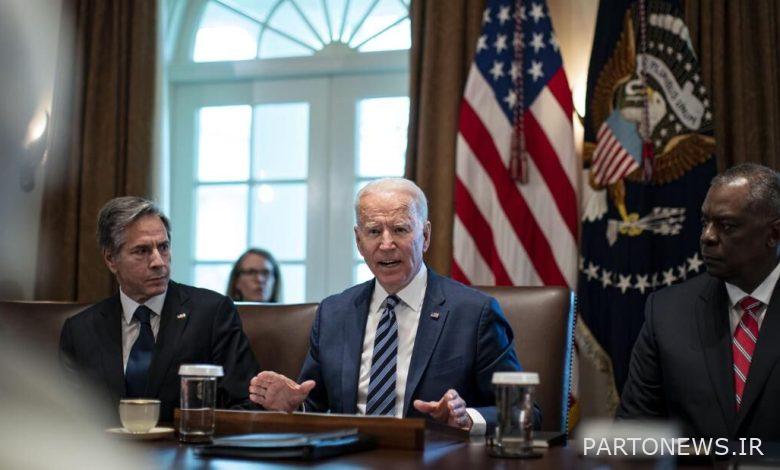American officials: The Biden administration has no decision to suspend efforts to revive the JCPOA

The American newspaper Wall Street Journal reported on Tuesday local time, quoting American officials, that Washington does not intend to suspend diplomatic efforts to reach an agreement with Iran, but the intensive program of the Biden administration at the domestic level will give less time to reach an agreement in It is up to Washington.
This American media continued that although the revival of the JCPOA is one of the priorities of the foreign policy of the Biden government, American and European officials are not very optimistic about the revival of the JCPOA before the mid-term congressional elections.
Henry Rome, research vice president of the Eurasia Group, said that if the Iranians present an acceptable proposal, the United States will probably be willing to cooperate. But in the current political situation, it doesn’t seem that Washington has used all its efforts to revive the JCPOA.
According to IRNA, US Secretary of State Anthony Blinken claimed in Mexico on Monday night that Iran’s response is a backward step and makes the prospect of reaching an agreement unlikely in the short term.
Blinken stated that he could not provide a timetable in this regard, but claimed that Iran is unwilling or unable to do what is necessary to reach an agreement.
A senior Israeli official told reporters during Prime Minister Yair Lapid’s visit to Germany: Americans and many Europeans have said that there will be no JCPOA.
According to IRNA, The Times of Israel website wrote that the US Ministry of Foreign Affairs issued a statement on Monday night (September 21) rejecting the statements of a senior official of the Zionist regime regarding Washington’s withdrawal from negotiations to revive the JCPOA and emphasized that the US efforts to Reaching an agreement with Iran continues.
France, Germany and England issued a joint statement on Saturday, September 19, claiming that Iran did not use a sensitive diplomatic opportunity, and in a baseless claim, they declared that Iran instead expanded its nuclear program beyond any civilian justification. Acceptable continues.
According to IRNA, the statement of the three European countries made this claim: In this final package, the coordinator made more changes that brought us to the limit of our flexibility. Unfortunately, Iran has chosen not to use this critical diplomatic opportunity. Instead, continue to expand its nuclear program beyond acceptable civilian justification.
In the continuation of this European Troika statement, it was claimed: While we were getting closer to the agreement, Iran raised separate issues related to its binding and legal international obligations under the NPT and the NPT Safeguards Agreement concluded with the IAEA. The International Atomic Energy Agency was related. This new demand creates serious doubts about Iran’s intentions and commitments to the successful outcome of the JCPOA. Iran’s position is in conflict with its legally binding obligations and endangers the prospect of revitalizing the JCPOA.
The new round of negotiations to lift Iran sanctions after a five-month break began on August 13 in Vienna, and these negotiations ended after four days on August 17 when the delegations returned to the capitals.
The holding of this round of negotiations took place after the European Union’s foreign policy official claimed in the Financial Times newspaper that he has put a new proposal package on the table, which includes up-to-date solutions regarding the lifting of sanctions and Iran’s nuclear steps.
On August 25 (August 16), the Islamic Republic of Iran sent its comments and requests regarding the European Union’s proposals for sanctions relief talks in Vienna, and after more than a week, the United States gave its opinion on the issue on August 24 (August 24). presented to the European Union.
The spokesman of the Ministry of Foreign Affairs, Nasser Kanani, informed the coordinator on the 10th of Shahrivar (September 1st) about the submission of the Islamic Republic of Iran’s comments regarding the US response to the text of the draft agreement on the lifting of sanctions and said: After receiving the US response, the Islamic Republic of Iran’s expert team was carefully examined and Iran’s responses were compiled and delivered to the coordinator after evaluation at different levels. The submitted text has a constructive approach with the aim of finalizing the negotiations.
The talks have reached the crucial stages while reaching the finish line and the final agreement is pending the political decisions of the West, especially the United States of America as the party violating the 1994 agreement.
The delegation of the Islamic Republic of Iran emphasizes that it is necessary to reach an agreement, the stability of the lifting of sanctions is guaranteed in some way, and that an issue should not remain as a lever of pressure to be used against Iran in the future, and it is looking for an agreement in which the economic benefit of the people is ensured. Iran’s foreign trade should be removed and illegal restrictions on oil sales should be removed. From this point of view, if the opposite party accepts Iran’s logical demands and the requirements for the formation of a stable and reliable agreement, the final agreement will be reached.

